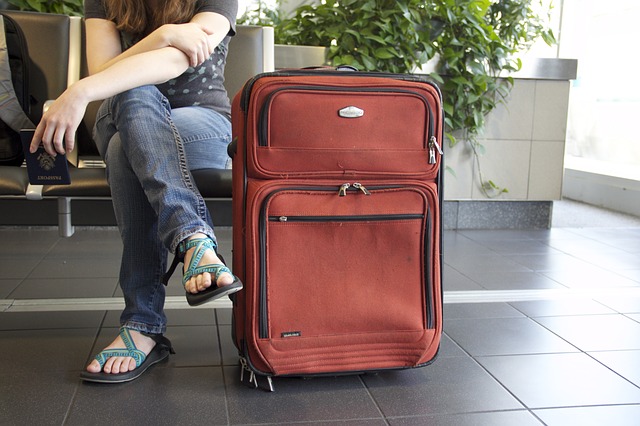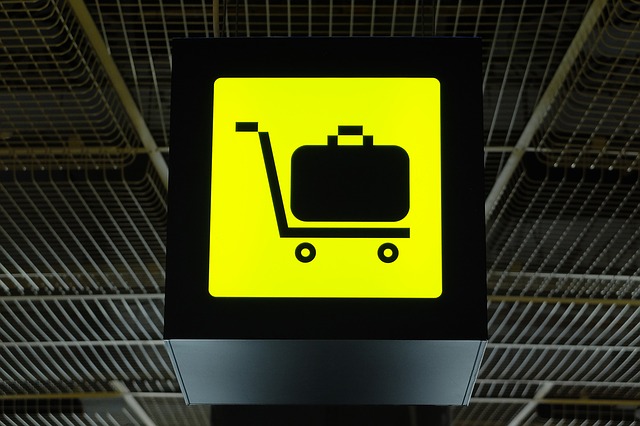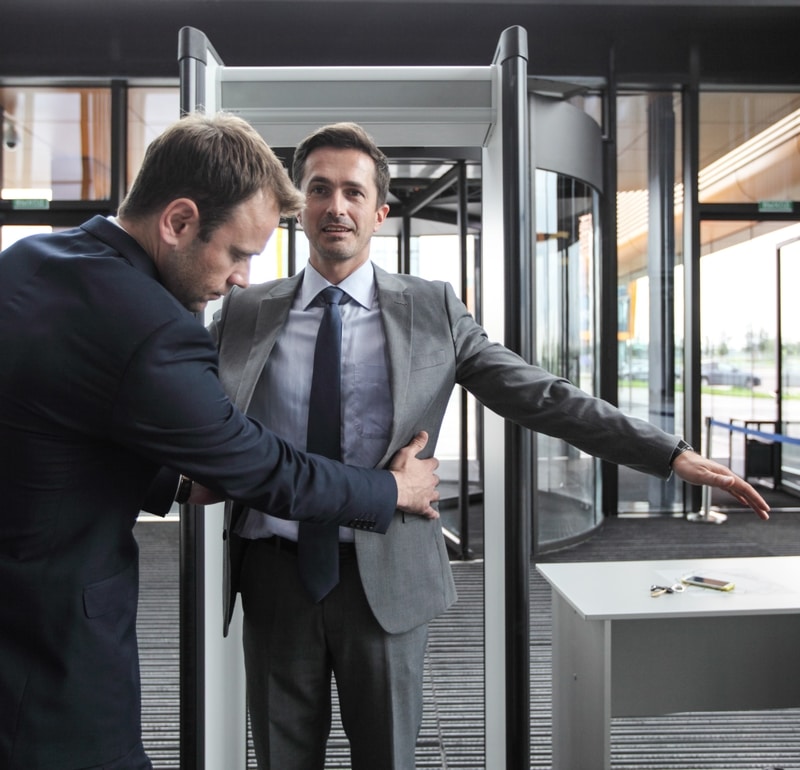To ensure the beginning of your flying trip is as pleasant as possible, please follow the instructions below:

Prior to your trip, carefully check the airline’s rules about carry-on (hand) luggage and take them into consideration in order to prevent potential inconveniences at the security check. To ensure your safety and that of other passengers, airport staff will also check hand luggage and determine its adequacy. Any carry-on bags that exceed the allowed quantity, weight and dimensions must be handed over upon flight check-in in order to avoid them being taken from you at the gate or having yourself denied boarding. Musical instruments of large dimensions do not fit into the carry-on luggage category and will have to be placed into the aircraft’s hold. It is forbidden for your hand luggage to contain any sharp or pointed household items, such as cutlery, pocket knives, razors, scissors, nail files, knitting needles, etc.
You can check detailed information on carry-on luggage at the website of your selected airline.
In addition to carry-on luggage, each passenger may bring on board the following items:
If travelling with a small child, you may bring on board:
Passengers with restricted mobility may bring on board:
During security checks, the permitted liquids must always be taken out from the carry-on luggage item and screened separately.
Carry-on luggage may only contain a small quantity of liquids, which must be stored in containers of 100 ml (3.4 oz.) or 100 g maximum, which in turn must be placed into transparent plastic bags with a maximum volume of 1 litre. Such bags can also be obtained at the airport’s check-in counters.
Liquids include:
You may still:

Upon check-in, luggage is weighed and tagged. At the end of the check-in process, passengers will receive a hold luggage receipt. In the event of luggage being lost, the receipt is proof that the passenger has indeed checked in luggage; therefore, we ask you to keep it.
Each item of luggage:
The maximum allowed volume and weight of hold luggage differs from one airline to another. If the maximum is exceeded, you will have to pay a surcharge. For this reason, check your airline’s limitations before travelling. For charter flights, enquire about luggage allowances with the agency you have booked through.
The airline must issue a special preliminary certificate allowing for the transportation of special types of luggage. We therefore we advise you to contact your selected carrier for detailed information on the terms and conditions of transporting such luggage.
Special types of luggage include:
Small animals may travel in the aircraft cabin if they are placed in an appropriate bag, basket or cage in accordance with the airline’s rules and regulations. The total size and weight must not exceed the foreseen restrictions. You must inform the airline of your intention to transport a pet upon purchasing your ticket.
Larger animals may only be transported in the aircraft’s hold, kept in a cage that allows them to stand up and turn around. We advise you to enquire with the airline as to the details and surcharges to transport animals, which in turn depend on the animal’s weight and destination.
The animals must be marked with a microchip, and upon check-in you must also present their passport and a vaccination certificate. Further restrictions apply for entry to certain countries such as the UK, Switzerland and Malta.
To obtain more detailed information on the subject, consult government websites or enquire at the consulates of the countries you intend to visit, or read the relevant regulations and provisions (2004/595/EC and 2004/824/EC)
If your checked luggage has not arrived at the same time as you, or if it has arrived damaged, you should report the irregularity to the airline you flew with. You may also seek assistance from the "Izgubljena prtljaga" (lost luggage) service at the Maribor Edvard Rusjan Airport.
Slovenian citizens may travel to EU countries and a few other countries only with their national ID card
All passengers must be in possession of the following documents:
Prior to travelling, you must procure the visas you might require to enter the country of your destination. Do not forget the rule that a passport should remain valid for at least six months after your entry to any foreign country, and that children must also have ID.
Upon check-in, border control and, if required, boarding pass control, certain officials or service personnel will verify the adequacy and validity of the documents and check your identity. The information stated in your personal identification document must match the information on the air ticket, as the latter is not transferable. Should you fail to present valid ID, you will be denied boarding. Because changes to air tickets are subject to extra fees, upon booking you should therefore carefully check that the information stated in you ID matches what is written on the air ticket.
Incomplete documents or failure to comply with exit and entry requirements may have unpleasant consequences (fines, denied entry into a country, etc.). Detailed information about the documents required to enter a country is available from the airline. It is the sole personal responsibility of each passenger to meet the conditions to enter a certain country or to be in transit in that country. For any travels of EU citizen passengers between Member States within the Schengen area, a national ID card is sufficient, while others require a passport. A driver’s licence is not a valid travel document.
From August 16th 2021 on, all passengers entering Slovenia via air (all flights, including private ones) or by sea (cruise ships only) are required to complete a digital Passenger Locator Form, prior to entering the country.
Click on https://app.euplf.eu to fill out the form.
This is a form that makes it easier to track contacts in cases where passengers are exposed to an infectious disease during their journey. The information provided by passengers can be used by public health authorities to quickly contact passengers and their contacts in order to prevent the further spread of the disease and to protect their health. The website https://app.euplf.eu is a single entry point for the collection of electronic PLF forms (Passenger Locator Form), and at the same time enables easier and faster collection and exchange of data between EU Member States, making contact tracing more efficient and effective.
Find out more: https://www.euplf.eu/sl/eu-dplf-2/index.html.


The check-in counters are marked with the airlines logos and class of travel, and open between 90 and 120 minutes prior to flight departure. Check-in counters close 30 minutes prior to the departure of the plane. Should a passenger be late for check-in, the airline has the right to refuse him/her travel.
Information on air passenger rights is listed at the following site: https://europa.eu/youreurope/citizens/travel/passenger-rights/.
In order to ensure the fulfilment of the rights of disabled and reduced mobility persons under the provisions of REGULATION (EC) no. 110/2006, the Maribor Edvard Rusjan Airport provides the personnel, premises and tools required to perform the services at their disposal.
Persons of reduced mobility are provided assistance from the moment they arrive to the airport’s designated area (disabled parking place), to and from the aircraft, and to the designated area to leave from the destination airport, which includes boarding and disembarking the aircraft.
The airport has special reserved and clearly marked disabled parking places in the immediate vicinity of the passenger terminal, where there is full wheelchair access to all areas. Disabled passengers are welcomed upon their arrival to the airport, and assistance is then provided at all check-in counters where airport staff will help with the check-in procedure. If a passenger does not have his/her own wheelchair, airport personnel will use wheelchairs available for hire at the terminal, taking care of the passenger from his/her arrival to the boarding of the aircraft where cabin crew will take over, or vice versa upon disembarkation.
All passenger areas inside the terminal have been designed to allow the disabled and people with reduced mobility to reach them without any problems, all of the designated paths and areas being clearly marked using internationally recognised signage and standards. The category of passengers whose medical condition requires attention and assistance on boarding and disembarking, as well as during the flight, in the case of quick evacuation and for ground services, includes: disabled people, patients with illnesses and injuries, pregnant women and elderly who require special assistance.
The category of disabled people includes:
Other categories:
The airlines have the right under special circumstances (extraordinary flight conditions, exceptionally bad flight conditions) to refuse the transportation of any of the passenger categories whose conditions call for assistance.
Universal acronyms are in place designating the degree of assistance needed, attributed to passengers upon booking. Therefore, we ask that at the time of purchasing your ticket you provide as many details as to the type of assistance you will need. If you do not, then your airline and airport personnel will not be able to assist you. In the most extreme of cases, the airline might even deny boarding.
To ensure your safety and that of other passengers, every person must undergo airport security screening and the carry-on luggage check before proceeding into the departure area.

General rules for airport security checks:
Do not leave your luggage and belongings unattended. They could be treated as suspicious by airport security personnel. If you notice an abandoned item of luggage in the terminal, notify airport personnel immediately. Your luggage should not contain dangerous items, and you should not carry packages for others.
The entire airport area is placed under video surveillance (CCTV).
You may use a special form to report to the Civil Aviation Agency of the Republic of Slovenia on the events or things related to security, or on unusual events that could result in dangerous consequences for the environment and human beings.
Such information can serve as a warning and prompt the removal of potential hazards.
Reports can be filed anonymously.